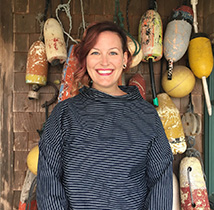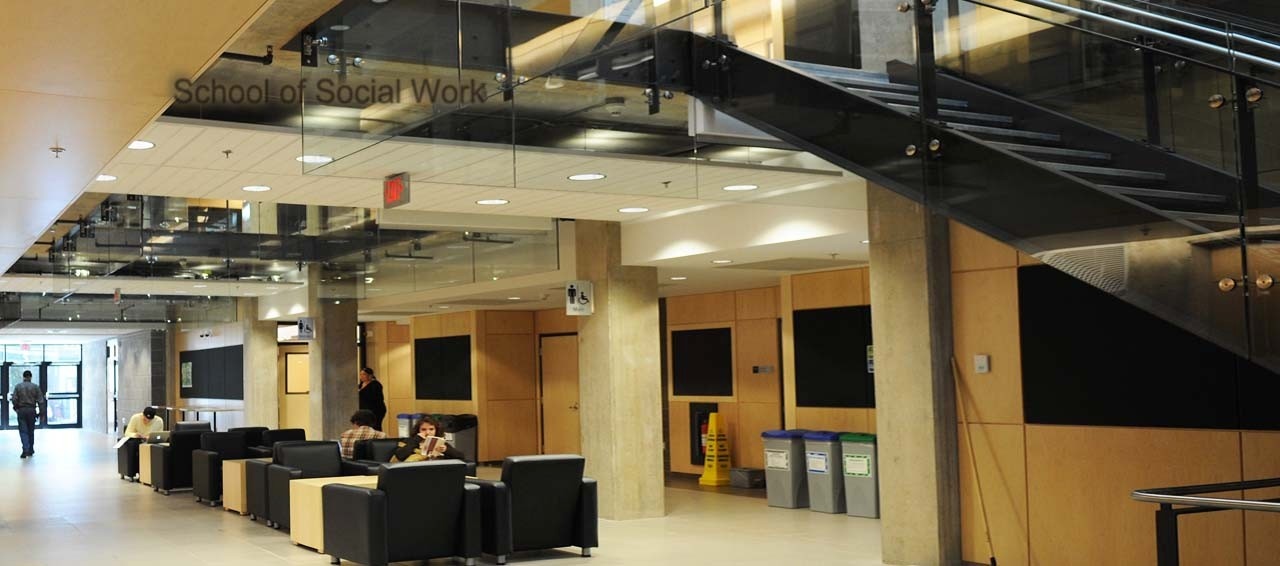Why Choose Social Work?
Gain knowledge and experience in how to help individuals, families and communities, and promote policy to provide a better environment in which to live. The School of Social Work's vision is a commitment to building a socially just society, defined as one that upholds and validates the values of equality, diversity, inclusiveness, democracy and concern for human welfare. We manifest and advance curricula, scholarship and school culture that are congruent with those values. Learn more about the profession of Social Work.
Read more about some of Social Work's graduands and the important work they have been doing.
School of Social Work Anti-Black Racism Statement
The Dalhousie University School of Social Work recognizes the historical and contemporary role social work, as a profession and as an educational entity, has played in the oppression and marginalization of people of African Descent. We stand against anti-Black racism in all its manifestations. We acknowledge and take responsibility for the intergenerational trauma and institutional racism we have participated in and perpetuated, such as the removal and institutionalization of African Nova Scotian children. We seek to build and repair relationships with African Nova Scotia communities. As a way to address these harms, as a School we are committed to ongoing processes of decolonization, reparations and anti-racism work aimed at redressing burdens of colonialisms and slavery. Our commitment also means denouncing police, state, and structural violence toward people of African Descent and aligning with and supporting the Black Lives Matter movement.
Download the statement.
School of Social Work Indigenous Statement
Mourning the Children
At the School of Social Work we share in the grief and join with the country in mourning the beloved children recently discovered buried in unmarked graves at the site of the Kamloops Residential School.
We stand with Indigenous colleagues, students, and communities through this horrendous time. Our profession must continue to grapple with the complexities of our role in the harms of residential schools and contemporary child welfare practices with Indigenous peoples. As a School, we are committed to the work necessary to educate social workers to be able to work in relationship with Indigenous peoples and build a profession that is accountable to our historic and contemporary wrongdoing.
We continue to take guidance from the advocacy of the First Nations Caring Society and their calls to concrete action that we can advance as citizens and as representatives of the profession (fncaringsociety.com).
Faculty & Research
Our professors engage and challenge students to develop their skills, emphasizing social policy, professional values, theoretical perspectives, and practice methods. Learn more about our faculty and their research specializations.

Eli Joy Manning
January 13, 1976 to January 17, 2025
We invite people to come and share stories and memories as we celebrate Eli’s incredible presence at the School of Social Work, Faculty of Health, and Dalhousie.
| Date: | Wednesday, February 5th |
| Time: | 3:00 – 4:00 |
| Location: | Suite 3201 Mona Campbell building (3rd floor, School of Social Work wing) |
MOU between Dalhousie and the Government of Mexico
School of Social Work, Associate Professor, Dr. Raluca Bejan's research on temporary foreign workers facilitates an MOU between Dalhousie University and the Mexican Consulate. Read more.
Equity, Diversity, and Inclusion in the Post-Secondary Research System
Dr. Merlinda Weinberg served as a member on the Expert Panel for the Council of Canadian Academies, a non-profit organization, tasked with assessing the evidence on complex scientific topics of public interest used to inform decision-making in Canada. This report was sponsored by the Tri-Council agencies, SSHRC, CIHR and NSERC, along with four other national organizations to answer the question “What is the state of knowledge regarding measures that organizations in Canada and around the world are implementing to achieve equity, diversity, and inclusion in the post-secondary research system?” The panel released its report, available here: https://cca-reports.ca/reports/equity-diversity-and-inclusion-practices-in-the-postsecondary-research-system/
Statement Regarding Israeli-Palestinian Conflict
The School of Social Work calls for an “Immediate” ceasefire and an end to violence in the Israel-Palestine political crisis. We condemn the violence committed by Hamas and mourn the tragic loss of life among the citizens of Israel following the October 7 attack on Israeli citizens.
We equally mourn the tragic loss of life in Gaza, a region where 50% of the population is comprised of children and whereas 70% of casualties have been comprised of women, children and the elderly.
We also oppose blocking access to fuel, electricity, water and food to people in Palestine, which will result in lack of access to medical aid.
We also oppose the evacuation order of 1 million Palestinians from northern Gaza, within the context where Israel does not recognize their right to return. We join with the UN's call for a humanitarian pause in the war on Gaza.
As a School of Social Work we join in condemning both Antisemitism and Anti-Palestinian racism.
We also join with others to recognize the need for ongoing critical analysis of the social, political, and historic complexity in the region that includes decades-long occupation of Palestine and the deprivation of people from the land.
We join with all Israelis and Palestinians who are calling for peace.
Contact
The School of Social Work is located on the third floor of the Mona Campbell Building which is situated on the corner of Coburg Road and LeMarchant Street.
| Mailing address:
School of Social Work Dalhousie University 1459 LeMarchant Street, Suite 3201 PO Box 15000 Halifax, NS B3H 4R2 Canada |
Courier address:
School of Social Work Dalhousie University 1459 LeMarchant Street, Suite 3201 Halifax, NS B3H 4R2 Canada |
| Main Office: 902-494-3760 Fax: (902) 494-6709 General inquiries: social.work@dal.ca |



